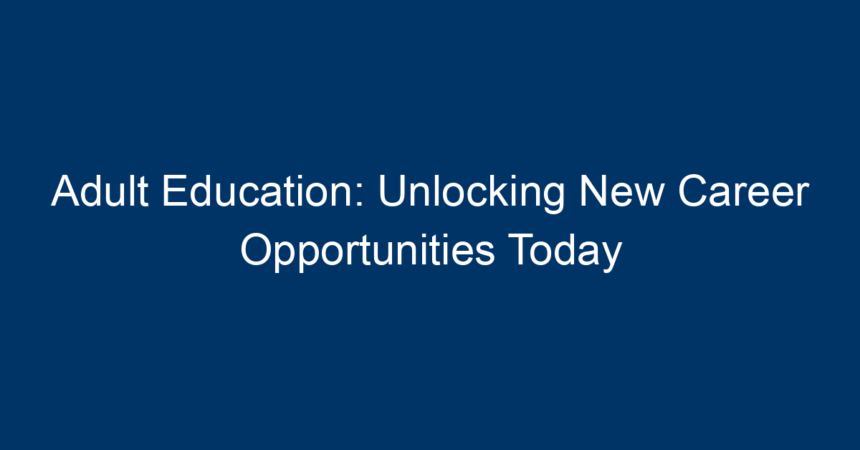In today’s fast-paced and ever-evolving job market, the importance of adult education cannot be overstated. With technology advancing at breakneck speed and industries constantly shifting, many adults find themselves needing new skills or qualifications to remain competitive. Whether you want to switch careers, update your skill set, or pursue lifelong learning, adult education can be the key that unlocks new career opportunities. In this article, we will explore the significance of adult education, various learning avenues available, and actionable strategies to enhance your educational journey.
Understanding Adult Education
What is Adult Education?
Adult education encompasses a variety of educational programs designed for individuals beyond the traditional college age who seek to gain new knowledge or refine existing skills. This form of education can take many shapes—ranging from formal university degree programs to informal workshops and online courses.
The Rise of Adult Education
The demand for adult education has surged in recent years, driven by factors such as technological advancements, globalization, and the need for continuous professional development. According to the American Association of Community Colleges, nearly 45% of U.S. adults enrolled in some form of postsecondary education programs are over the age of 25. This shows a profound shift in how education is perceived and pursued by those beyond the typical college age.
The Benefits of Adult Education
1. Career Advancement
One of the primary reasons adults pursue education is for career advancement. Whether through a degree, certification, or skill enhancement, adult education can lead to promotions, higher salaries, and better job opportunities. Employers increasingly value candidates who demonstrate a commitment to learning and self-improvement.
2. Personal Growth and Fulfillment
Beyond professional gains, adult education fosters personal growth. Engaging in learning activities stimulates the mind, encourages critical thinking, and allows individuals to explore new interests. Education can be a pathway to self-discovery, giving adults the chance to pursue hobbies or subjects they are passionate about.
3. Networking Opportunities
Adult education programs also present tremendous networking opportunities. Meeting like-minded individuals—whether in classes or workshops—can lead to valuable professional connections and collaborations. Many adult learners find these personal connections to be one of the most rewarding aspects of their educational journey.
Popular Adult Education Pathways
1. Online Learning
With the rise of technology, online learning has become an increasingly popular avenue for adult education. Platforms such as Coursera, edX, and Udemy offer courses across various fields—from business management to programming. Online education allows for flexibility, enabling you to learn at your own pace and fit studies into your busy schedule.
2. Community Colleges
Community colleges offer a myriad of programs tailored for adult learners, including vocational training, associate degrees, and certification programs. These institutions are often more affordable than traditional universities and provide a supportive environment for adult students, making them an excellent choice for those looking to enhance their skills or switch careers.
3. Workshops and Short Courses
Many organizations and educational institutions provide short workshops and courses focusing on specific skills or topics. These are particularly useful for adults seeking to quickly acquire new skills without committing to long-term programs. Subjects can range from public speaking to digital marketing, and the concentrated format can lead to immediate application in the workplace.
4. Self-Directed Learning
Adult education doesn’t always have to be formal. Self-directed learning, which involves individuals taking the initiative to identify their learning needs and finding resources to meet those needs, is a powerful way to acquire new knowledge or skills. This could involve reading books, watching instructional videos, or participating in online forums and communities.
Overcoming Barriers to Adult Education
1. Time Constraints
Many adults struggle to find the time to dedicate to education due to job responsibilities and family commitments. However, modern technology and flexible learning formats can help mitigate this barrier. Online courses allow for learning in short, manageable increments that can fit into even the busiest schedules.
2. Financial Concerns
Cost can often deter adults from enrolling in educational programs. Fortunately, there are numerous financial aid options available, including scholarships, grants, and employer-sponsored educational assistance programs. Exploring these options can make adult education more accessible and affordable.
3. Fear of Returning to School
Returning to education can be daunting, especially for those who have been out of the learning environment for years. However, many colleges and programs are tailored specifically for adult learners, providing support and resources that can ease this transition. Joining study groups, connecting with peers, and seeking mentorship can further help boost your confidence.
Actionable Insights for Aspiring Adult Learners
1. Identify Your Goals
Before embarking on your educational journey, take some time to identify your goals. Whether you’re looking to advance in your current career, switch fields, or simply learn something new, having a clear understanding of your objectives will guide your choices.
2. Research Your Options
With a plethora of adult education options available, it’s essential to research and find what suits you best. Compare different programs, read reviews, and reach out to former students to gain insights into their experiences.
3. Create a Schedule
To effectively manage your time, create a study schedule that fits around your existing commitments. Consistency is key, so dedicate specific hours each week to your educational pursuits.
4. Engage with Your Learning Community
Take advantage of networking opportunities by engaging with your learning community. Participate actively in discussions, forums, and workshops to enhance your learning and make valuable connections.
5. Leverage Technology
Use technology to your advantage in your adult education journey. There are numerous tools and resources available online to enhance your learning experience, from digital textbooks to productivity apps that can help you stay organized.
Conclusion: Embrace Adult Education Today
In summary, adult education is not just a pathway to career advancement; it is a doorway to personal growth, networking, and lifelong learning. In an age where change is the only constant, embracing education as an adult is crucial for staying relevant and fulfilling one’s potential.
Whether you choose online learning, community colleges, workshops, or self-directed study, the opportunities for growth are vast. Take that first step—unlock new career opportunities by engaging in adult education today. Remember, the pursuit of knowledge is a journey that lasts a lifetime. So, why wait? Your future self will thank you!




